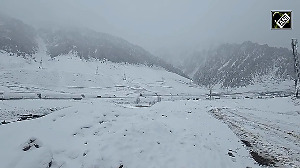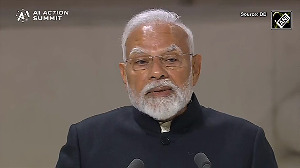Amid much fanfare, the India-United States nuclear agreement was reached on March 2.
Though the actual details and the fine print are not available as yet, the indications are it is a workable agreement that both sides should strive to move forward.
One important issue made clear is that the fast breeder reactor programme is out of the civilian list, as also all the research reactors.
This should please our nuclear establishment.
'National interest is at stake'
One hopes that while finalising the separation list adequate care is taken in conditionally positioning various nuclear facilities upstream and downstream of the reactors, particularly since most of them are dual-purpose facilities.
This is very important as all of them have been developed and built indigenously through decades of dedicated painstaking research and development efforts.
Let's wait for the details before celebrating
One also hopes that the deal covers only those reactors in operation and under construction with India retaining the prerogative to classify future reactors built entirely on our own without any external inputs.
It should be ensured that the stockpile of indigenous spent fuel and the separated nuclear material accumulated is kept outside the gamut of safeguards. There is a big question mark as to how the deal will be handled if there is any time limit is fixed -- such as 2014, as some sources indicate.
This is an agreement that should benefit both US and India. The US will stand to gain by revitalising its dormant nuclear industry and help in stabilising demand for Middle East fuel and the cost, as Washington itself has claimed.
It is quite possible that the skilled manpower and manufacturing capabilities of India could also be utilised in the design, construction and operation of American reactors!
In fact, in view of our advanced nuclear capabilities, there is no case for India to be defensive while negotiating. Except that we are short of uranium, we can deal as equal partners.
N-deal: Coup or sellout? Tell us
The 65 to 35 split is itself a generous giveaway. We should ensure we are left with adequate number of reactors under the non-civilian list to meet the demands of fast breeder reactors and strategic requirements.
The deal is still in its beginning and there is plenty of homework to be done by India in negotiating the safeguards agreements -- which should not be unduly intrusive.
The weapons States have got away lightly and there is plenty of scope for negotiations with tact and courage. This is a very crucial aspect from now on.
Fortunately, the agreement indicates an India-specific safeguards agreement. Before any firm commitments are made regarding safeguards, it is better to await progress on the US side of the deal.
Dr A N Prasad, former director, Bhabha Atomic Research Centre, is a distinguished nuclear scientist and an international authority on the issue of nuclear safeguards.
Also see:
Complete Coverage: The Bush visit






 © 2025
© 2025